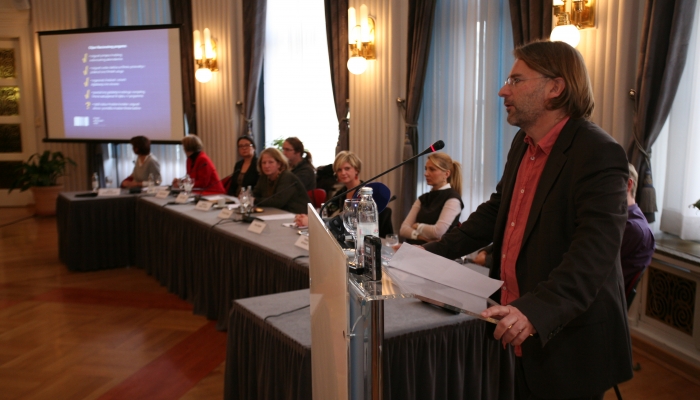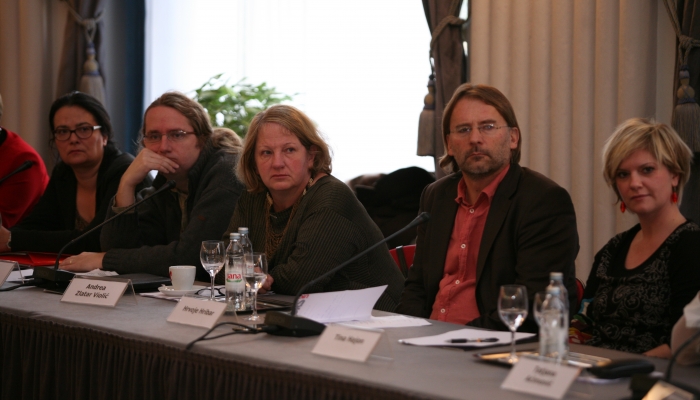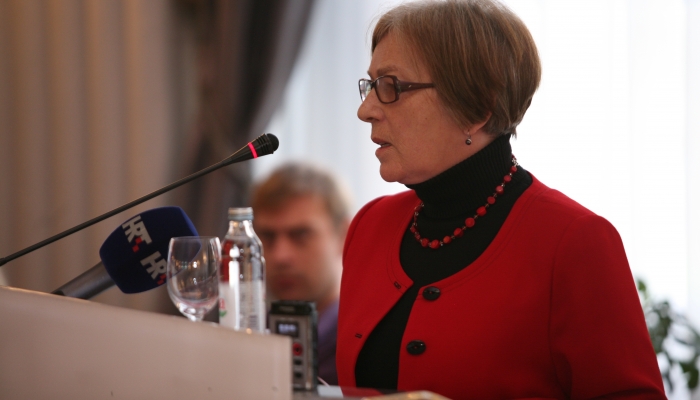Croatian Audiovisual Centre: Two Years of National Programme



Zagreb, 31 October – A press conference took place at Zagreb’s Novinarski dom focusing on the first two years since the National Strategic programme for Audiovisual Industry was adopted. The conference was organised by the Croatian Audiovisual Centre (HAVC) with the aim of familiarising the public with current conditions, accomplished goals and critical issues in the implementation of this strategic plan.
The National Strategic Programme for Audiovisual Industry is a strategic plan defining goals for the development of Croatian film industry from 2010 to 2014. The Programme was written by HAVC experts and monitored by the Croatian Audiovisual Council. On 25 October 2010 it was accepted by Božo Biškupić, the former minister of culture. Antonio Nuić, head of the Croatian Film Directors Guild, was the first to address the gathered media and film professionals, reminding of the state of Croatian film industry at the time the National Programme was passed. The year 2010 was important for Croatian cinema. Until that moment the broader film community, especially directors, were unsatisfied with the situation on the local film scene. The National Programme diagnosed all these issues correctly, set out goals and offered solutions to the problems. Today, two years after the plan was presented, we are making progress on the road of achieving the goals established by the programme, said Nuić.
One of the key elements in accomplishing the goals set by the Programme was to ensure the implementation of Croatian audiovisual legislation, which was addressed to a greater degree by Romana Matanovac Vučković. Thanks to the adoption of the National Programme, conditions for regulation of private TV broadcasters’ debts were created via national concession and HRT’s debts for the first three years of HAVC’s existence, while the 2011 legal novelty gave HAVC an even better position in terms of outstanding receivables. Matanovac Vučković also stressed that the amendments to the Act on Audiovisual Activities from 2011 regulated the incentive system, thanks to which film services export was initiated. The incentive amounts to 20 per cent of the total amount spent in Croatia for the production of audiovisual works that qualify as cultural products. The head of the incentives’ programme Tatjana Aćimović explained that since the adoption of the Act and Regulation five international projects were filmed in Croatia. These productions occurred precisely as a result of the incentive measures. The reserved two-years’ financial means will ensure investment amounting to HRK 100 million, i.e. net income of HRK 80 million. This makes it the only programme which does not require investment but brings profit, said Aćimović, pointing out that indirect effects of these incentives are numerous, in terms of tourism and the field of harmonisation with the standards and legal framework of the European Union.
The coordinator of the independent cinema distributor network digitalization project, Tina Hajon, reported on the process of cinema digitalization, conducted by HAVC together with the Ministry of Culture. Digitalization is indispensable for independent cinemas to survive. However, this digitalization project is much more far-sighted and ambitious than the very technical upgrading of screening rooms. Therefore, HAVC has drafted programme guidelines as a part of contractual obligations for cinema providers with the intention of screening more culturally valuable contents in Croatian cinemas. Our aim is to enrich cultural offer in cities, give the audience a chance to enjoy a varied and diverse cinema repertory and, naturally, to increase the circulation and rates of European and Croatian films, said Tina Hajon, adding that in spring another 27 cinemas and six Croatian film festivals would be digitalised.
Croatian representative at Eurimages Sanja Ravlić and acting editor-in-chief of the Croatian Television Dean Šoša took a glance at one critical spot in the National Programme, which has already been intensely addressed. Sanja Ravlić commented on the increase in rates of Croatian film during the last year. In 2010/2011 Croatian films had only 18,000 viewers, while two years later the number increased tenfold. If we include minority co-productions in this calculation, which are also officially considered Croatian film, we will reach the number of as many as 347,452 viewers! However, Sanja Ravlić considers the situation in this area far from ideal, and determining the relations between participants in the distribution and presentation of Croatian, European and world non-commercial film is HAVC’s next great front for the well-being and sustainability of the audiovisual sector in the Republic of Croatia.
Dean Šoša pointed out the share of Croatian, documentary, short and animated film on national television, often in prime time. For a year and nine months nothing happened. In the last three months HRT awoke and hopefully will not go back to sleep any time soon. We are facing efforts in resurrecting the drama section, for which we yet need to create prerequisites, because in 2013 our budget will be devoured by soap operas made and broadcasted long ago. We also need to rejuvenate the children’s programme and many other things. However, debts accrued over twenty and more years cannot be paid off overnight, said Šoša.
Vera Robić-Škarica, head of the Croatian Audiovisual Council, highlighted the National Programme’s pink pages. There are as many as ten feature titles currently being filmed, already filmed or in post-production – two debuts and two intended for children and youth. All of them should be completed by the next Pula Film festival at the latest. Adding to that the titles realised outside the institutional financing framework, the total number of films rises to 13-15. This means that now, after two years, we have achieved the situation we announced in the National Programme’s pink pages.
Vice-president of the Croatian Producers’ Association Dana Budisavljević finally reviewed the good and critical points in the first two years of HAVC’s activity after the adoption of the National Programme. HAVC marked the beginning of a new era in the domestic film production. From the producers’ point of view, there are two new key moments: investment in screenplay and project pitching and investment in co-productions. The results of this new method cannot be visible overnight, because an average film takes three to five years for realisation, but we are firm in our belief that very soon we will be watching better and more interesting films. As a critical issue she highlighted cinema distribution and collaboration with the production department of HTV, adding that HAVC is currently the best such institution for audiovisual industry in the entire region, including Hungary, Bulgaria, Romania and Italy, which makes us a proud, but also eligible partners on the European scene. What we aspire to are Austrian or Danish results, for instance.
Towards the end of the conference, the closing remarks came from the head of the Croatian Audiovisual Centre Hrvoje Hribar and the minister of culture of the Republic of Croatia Andrea Zlatar Violić.
Hrvoje Hribar looked back to February 2011 when the National Programme was presented at the Chamber of Economy. The decision to present bad indicators in the audiovisual industry in an optimistic and activist manner paid off. If we take a look at indicators in four strategic goals, our success is obvious, we are actively working on four strategic goals: implementation of audiovisual legislation, digitalization, incentive measures system, increase of visibility and rates of Croatian, European and non-commercial world film, and annual production. What remains to be done in the following two years is the reform of Croatian Cinematheque within the Croatian State Archive and tackling the challenges of distribution and presentation in the Republic of Croatia.
Hrvoje Hribar also pointed out that HAVC is a small and efficient institution in which a small number of people can perform many duties and which believes that a better form of public institution is possible. Naturally, many things in HAVC could be done better, but when we accomplish that, we can imagine a page even pinker than the one mentioned by Mrs. Robić-Škarica, as well as much more efficient tackling of challenges in the local film industry. Just as I can imagine a better HAVC, I can also imagine a situation with no HAVC. All of us in Croatia remember periods of short-term flashes of brilliance, destroyed very soon by someone’s reckless or mean behaviour. We will not allow HAVC to become one such legend.
At the end of the conference, the minister of culture Andrea Zlatar Violić commented on the displayed results, especially digitalization and incentive measures, stressing that they are a result of realistic, concrete and continuous work. HAVC is the only Croatian institution of the type: an umbrella institution – covering audiovisual activity in all of its aspects – and an operative institution – because it contains control mechanisms and clearly separate functions and jurisdictions. As such, it made quite a progress in the first four years of its existence. It is extremely important to see the audiovisual activity work as an autonomous institution, because it presents a cultural and economic good and is an important element of our civilisation and cultural education. Minister Zlatar Violić also pointed out that one of the new moves of the Ministry of Culture would be to organise other cultural sectors with cultural and economic importance in a manner similar to HAVC and establish the Book Centre.
The minister concluded her address in the following words: I congratulate all those who have participated in these two years of the implementation of the National Programme. I believe your presence here today is a sign of unity in a community which understands that partner relations are a manner of achieving the aims set in our national strategy.
For all further information, please contact press@havc.hr, while high resolution photographs are available for download here.
Photographs by Oleg Moskaljov.
Cover photos: Hrvoje Hribar; Sanja Ravlić, Dean Šoša, Andrea Zlatar Violić, Hrvoje Hribar, Tina Hajon; Vera Robić Škarica
